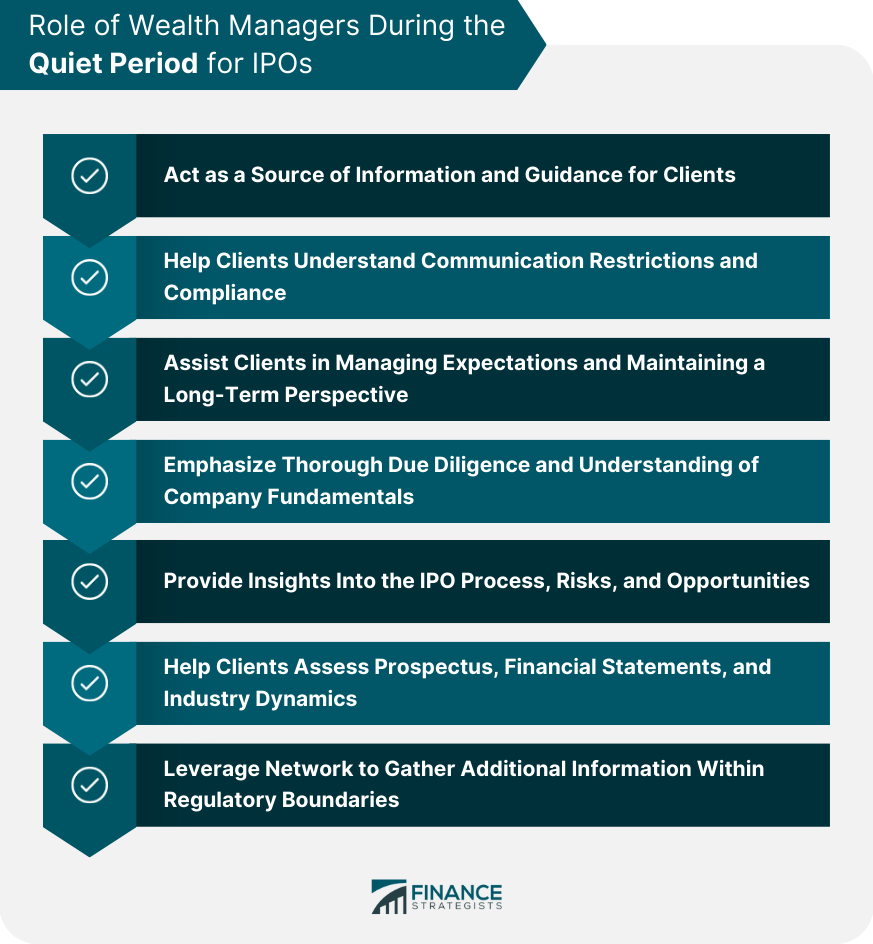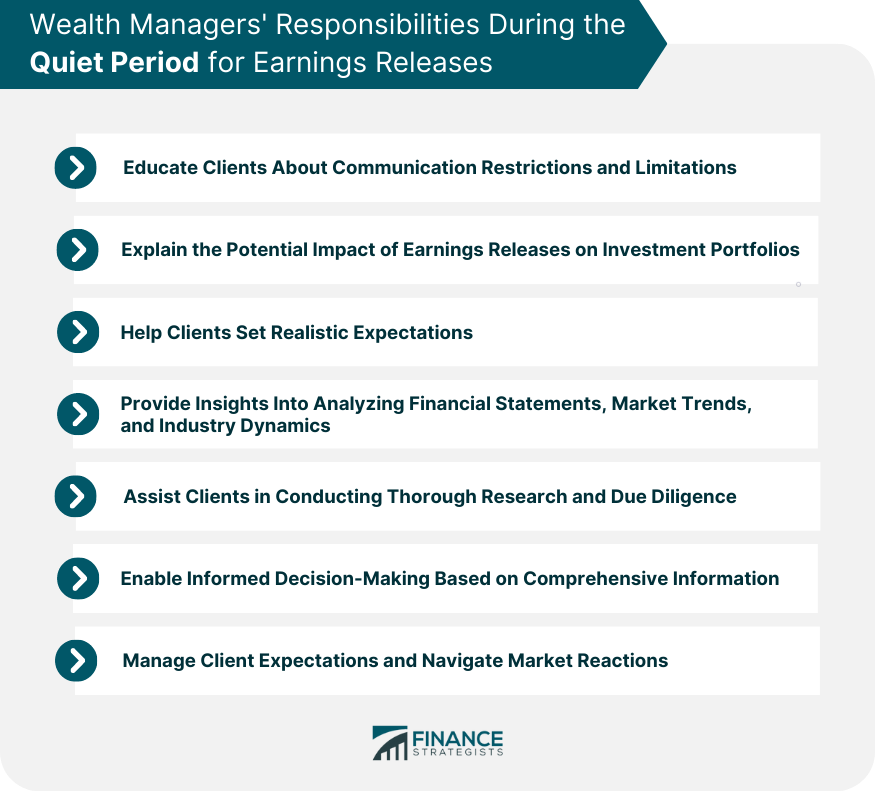The Quiet Period, also known as the restricted period, refers to a designated time frame when companies are restricted from promoting or discussing their securities publicly. It is typically associated with key events such as initial public offerings (IPOs), earnings releases, and mergers and acquisitions (M&A). During this period, companies must adhere to specific guidelines to ensure fair and equal access to information for all investors. The Quiet Period serves multiple purposes. It aims to prevent potential market manipulation or the selective release of information that could unfairly impact investors. It promotes transparency and ensures that all investors have equal access to material information. The Quiet Period also allows for a more controlled and orderly dissemination of information, reducing the potential for market volatility and investor confusion. In order to gain a comprehensive understanding of the Quiet Period, it is essential to become familiar with the legal and regulatory framework that surrounds this concept. The U.S. Securities and Exchange Commission (SEC) plays a pivotal role in overseeing and regulating the securities industry. The SEC has established specific regulations and guidelines related to the Quiet Period to maintain market integrity and protect investors' interests. The Quiet Period entails a set of rules and restrictions that companies must abide by during specific financial events. These rules dictate limitations on promotional activities, public statements, and the disclosure of material information. In addition to SEC regulations, other laws and guidelines may come into play during the Quiet Period. Various stock exchanges and regulatory bodies may have their own specific requirements that companies must adhere to. One significant event that entails a Quiet Period is the process of taking a company public through an initial public offering (IPO). An IPO refers to the process of offering shares of a private company to the public for the first time. It allows the company to raise capital and become publicly traded. IPOs are highly anticipated events that can significantly impact a company's valuation and market perception. During the Quiet Period preceding an IPO, companies and their insiders, such as executives and underwriters, are prohibited from engaging in any promotional activities or making public statements about the company. This restriction aims to prevent the selective release of information and ensure a level playing field for all investors. The Quiet Period imposes strict limitations on company communications during the IPO process. Companies must refrain from conducting media interviews, issuing press releases, or engaging in any form of public marketing. This restriction ensures that the information disclosed is accurate, complete, and simultaneously available to all investors. Wealth managers play a vital role in guiding their clients through the Quiet Period of an IPO. They help investors navigate the complexities and uncertainties associated with this phase. Wealth managers act as a source of information and guidance for their clients during the Quiet Period preceding an IPO. They help investors understand the restrictions and limitations imposed on company communications and ensure that their clients remain compliant. During the Quiet Period, wealth managers assist clients in managing their expectations and maintaining a long-term investment perspective. They emphasize the importance of thorough due diligence and understanding the company's fundamentals rather than relying on short-term market speculation or promotional activities. Wealth managers also provide insights into the IPO process itself, explaining the timeline, potential risks, and opportunities associated with investing in a newly public company. They help clients assess the company's prospectus, financial statements, and industry dynamics to make informed investment decisions. Furthermore, wealth managers may leverage their network and industry connections to gather additional information about the IPO company without violating the Quiet Period restrictions. This can provide valuable insights to clients while ensuring compliance with regulatory requirements. Apart from IPOs, the Quiet Period also plays a significant role in earnings releases, which are crucial milestones for publicly traded companies. Let's explore the Quiet Period in the context of earnings releases. Earnings releases are periodic announcements made by public companies to disclose their financial performance for a specific period. These announcements include information such as revenue, earnings, expenses, and other relevant financial metrics. During the Quiet Period preceding an earnings release, public companies must exercise caution regarding their communication with the public. The purpose of this restriction is to avoid the selective release of material information that could give certain investors an unfair advantage. The Quiet Period for earnings releases imposes limitations on company management, including executives and other insiders, from making public statements or engaging in promotional activities that could influence investors' perceptions before the official earnings announcement. This restriction ensures that all investors have equal access to the information simultaneously. Wealth managers play a crucial role in guiding their clients through the Quiet Period preceding earnings releases. They educate clients about the restrictions and limitations on company communications and the potential impact of earnings announcements on their investment portfolios. During this period, wealth managers help clients set realistic expectations and understand the potential risks and opportunities associated with earnings releases. They emphasize the importance of a long-term investment strategy and provide insights into analyzing the company's financial statements, evaluating market trends, and understanding industry dynamics. Wealth managers also assist clients in conducting thorough research and due diligence to assess the company's financial health and overall performance. By providing clients with comprehensive information and analysis, wealth managers enable them to make informed decisions based on the available data rather than succumbing to short-term market speculation. By effectively managing client expectations and providing valuable insights during the Quiet Period for earnings releases, wealth managers help clients navigate the potential volatility and market reactions associated with these significant financial events. In addition to IPOs and earnings releases, the Quiet Period also plays a crucial role in the context of mergers and acquisitions (M&A). Let's explore the Quiet Period in the context of M&A transactions. Mergers and acquisitions involve the consolidation of two or more companies to create a larger entity or facilitate business growth. These transactions have a profound impact on the companies involved, their shareholders, and the overall market dynamics. During M&A transactions, companies are typically required to observe a Quiet Period, which restricts the disclosure of information related to the deal. This restriction aims to maintain confidentiality, prevent insider trading, and ensure fairness for all investors. The exact duration and scope of the Quiet Period in M&A transactions can vary depending on the regulatory requirements, complexity of the deal, and the entities involved. The Quiet Period in M&A transactions prohibits companies from making public statements or engaging in promotional activities that could potentially impact the outcome or perception of the deal. This restriction ensures that all investors have access to the same information and that there is no selective dissemination of material information. During the Quiet Period, companies must exercise caution in their communications with the public, including shareholders, analysts, and the media. They must avoid disclosing any information that could potentially influence the market's perception of the deal or provide unfair advantages to certain investors. For wealth managers, the Quiet Period in M&A transactions poses unique challenges and considerations. They must navigate the restricted communication landscape while providing guidance and support to their clients. Wealth managers play a crucial role in managing client expectations and providing insights into the potential impact of the M&A transaction on their investment portfolios. They help clients assess the risks and opportunities associated with the deal and make informed decisions based on the available information. During the Quiet Period, wealth managers may need to explore alternative sources of information and analysis to supplement the restricted communication from the companies involved in the M&A transaction. They can leverage their network, industry knowledge, and research resources to gather valuable insights for their clients without violating the regulatory restrictions. Additionally, wealth managers assist clients in evaluating the potential financial implications of the M&A transaction, including factors such as synergies, integration risks, and future growth prospects. They provide guidance on portfolio adjustments, risk management strategies, and potential opportunities that may arise from the M&A activity. By effectively managing client expectations, providing insights, and navigating the challenges of the Quiet Period in M&A transactions, wealth managers contribute to ensuring that clients make well-informed decisions and are positioned to maximize the potential benefits of the deal. The Quiet Period, also known as the restricted period, is a timeframe when companies are prohibited from publicly promoting or discussing their securities. It ensures fair access to information, prevents market manipulation, and promotes transparency. Companies must follow specific guidelines restricting promotional activities and the disclosure of material information. The Quiet Period is governed by regulations, including those set by the SEC. Wealth managers play a crucial role during this period by guiding clients through the restrictions and compliance requirements. They educate clients about communication limitations, assist in managing expectations, and provide insights for informed decision-making. Wealth managers analyze financial statements, market trends, and industry dynamics. They also leverage their network to gather information within regulatory boundaries. In the context of earnings releases and mergers and acquisitions, wealth managers help clients evaluate risks, make portfolio adjustments, and maximize potential benefits. Their guidance ensures clients navigate these events successfully.Definition of the Quiet Period
Legal and Regulatory Framework
Securities and Exchange Commission (SEC) Regulations
Quiet Period Rules and Restrictions
Applicable Laws and Guidelines
Quiet Period in Initial Public Offerings (IPOs)
Overview of an IPO
Quiet Period Requirements for Companies Going Public
Restrictions on Company Communications During the Quiet Period
Role of Wealth Managers During the Quiet Period for IPOs

Quiet Period in Earnings Releases
Overview of Earnings Releases
Quiet Period Restrictions for Public Companies
Communication Limitations for Company Management During the Quiet Period
Wealth Managers' Responsibilities During the Quiet Period for Earnings Releases

Quiet Period in Mergers and Acquisitions (M&A)
Explanation of M&A Transactions
Quiet Period Rules for Companies Involved in M&A Activities
Communication Restrictions for Companies During the M&A Quiet Period
Wealth Management Considerations During the M&A Quiet Period
Conclusion
Quiet Period FAQs
The Quiet Period in wealth management refers to a period of restricted communication imposed on companies during critical financial events such as IPOs, earnings releases, and mergers and acquisitions. It aims to prevent the selective release of material information and maintain a fair and level playing field for all investors.
Wealth managers play a vital role during the Quiet Period for IPOs by guiding their clients through the restrictions and limitations on company communications. They provide information, insights, and support to help clients understand the process, assess risks, and make informed investment decisions.
The Quiet Period for earnings releases imposes limitations on company management from making public statements or engaging in promotional activities that could influence investor perceptions. This restriction ensures fairness and equal access to information among investors.
During the Quiet Period in M&A transactions, wealth managers must navigate communication restrictions and provide guidance to clients. They should help clients assess the potential impact of the deal, evaluate risks, and explore alternative sources of information while ensuring compliance with regulatory requirements.
Wealth managers employ various strategies to manage investor expectations during the Quiet Period. They focus on transparent communication, education, and maintaining a long-term perspective. By providing insights, resources, and addressing concerns, wealth managers help clients navigate the uncertainty and make well-informed investment decisions.
True Tamplin is a published author, public speaker, CEO of UpDigital, and founder of Finance Strategists.
True is a Certified Educator in Personal Finance (CEPF®), author of The Handy Financial Ratios Guide, a member of the Society for Advancing Business Editing and Writing, contributes to his financial education site, Finance Strategists, and has spoken to various financial communities such as the CFA Institute, as well as university students like his Alma mater, Biola University, where he received a bachelor of science in business and data analytics.
To learn more about True, visit his personal website or view his author profiles on Amazon, Nasdaq and Forbes.











